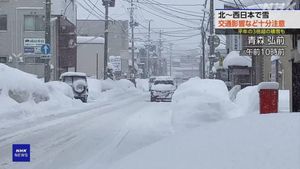Heavy snowfall has prompted significant closures across major highways in Western Japan, leaving travelers stranded and affecting transport operations throughout the region. Late on January 7, the NEXCO West Japan announced closures on key expressways connecting the Kansai Region and Nagoya, including the Meishin Expressway and the Shin-Meishin Expressway. This decision was taken to prevent large-scale traffic jams caused by the storm.
According to NEXCO, as of 9 AM on January 8, the closures had continued for around 12 hours without any clear timetable for re-opening. Snow accumulation data collected indicated varying depths across affected regions: Hikone City recorded 11 centimeters, Sekigahara Town had 9 centimeters, and Nakagyo Ward in Kyoto measured 7 centimeters. The snowfall levels raised concerns about not only travel but also safety on the roads.
With heavy snow predicted for the weekend, the Kinki Regional Development Bureau (近畿地方整備局) appealed to the public to reconsider travel plans and avoid unnecessary outings. Those who needed to travel were urged to check updated weather forecasts and roadway conditions, and to equip their vehicles with winter tires or chains for safety.
Specific sections of the highways under closure included the Meihan National Route between Kameyama Interchange and Tenri East Interchange, as well as the Tōmei Expressway between Komaki Junction and Kyoto Higashi Interchange. Other troublesome routes included the Hokuriku Expressway and the Keiji Bypass, leading to significant travel disruptions across the region.
Rail services were also severely impacted, with JR West announcing reductions on several train lines, especially those traversing the snowy regions. The final trains for the Lake Biwa Line between Omi Ikazuki and Omi Shiozumi were set to continue services at reduced frequency due to the conditions. Specifically, the Sunrise Seto/Izumo limited express trains faced cancellations, as did numerous services on the Hakuto line.
Travelers on the Tōkaidō Shinkansen and Sanyō Shinkansen should be aware of potential delays of up to two hours due to reduced speeds on certain sections. JR West reported adjustments were still underway to deal with the snow accumulation affecting train operations, as cleaning efforts at stations added to the delays.
Flight operations at Osaka Airport were also disrupted, with around 20 flights canceled to various destinations, including Niigata and Tajima airports, as airlines scrambled to manage the impact of the weather. Airline operators have been advising passengers to stay informed of potential changes to their flight schedules.
Given the state of the roads and continuing snowfall, authorities have warned of possible additional highway closings as conditions evolve. The Kansai region remains on alert, with monitoring activities to assess the snow's impact on transportation over the coming days.



